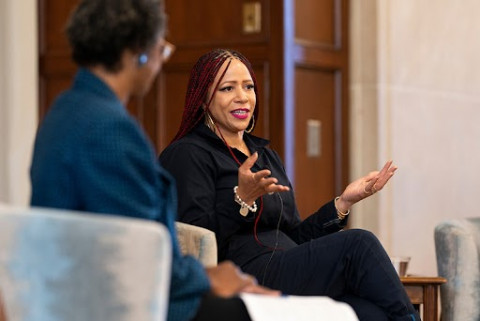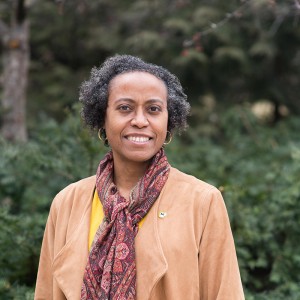Social Justice Changemaker Lecture: Realizing Justice and Equity in the Long Arc of History
October 21, 2024
Nikole Hannah-Jones was the keynote speaker at the fourth annual Social Justice Changemaker Lecture presented by the School of Social Work at the Michigan Union in October 2024.
Hannah-Jones is the Knight Chair of Race and Journalism at Howard University, where she founded the Center for Journalism & Democracy. Over the course of her career investigating racial inequality and injustice, she has earned numerous awards including a MacArthur Fellowship. But she is probably best known as the Pulitzer Prize-winning creator of the 1619 Project, which began as an initiative from The New York Times Magazine and has grown to include two books and a docuseries on Hulu.
The 1619 Project aims to reframe American history by placing slavery and its continuing legacy at the center of our national narrative. Hannah-Jones discussed the project’s origins, aspirations and evolution in a conversation moderated by Professor Terri Friedline and Trina Shanks, the Harold R. Johnson Collegiate Professor of Social Work.
The introduction to the event was given by U-M Vice Provost for Equity Inclusion and Chief Diversity Officer Tabbye Chavous, who challenged the audience to draw inspiration from Hannah-Jones. She encouraged attendees to take every opportunity to tell their own story and not let it be defined by others.
“Most Americans had no idea of how foundational slavery was to the society that was built,” said Hannah-Jones, “so I really wanted a project that would force us to acknowledge that date — that if you know the date 1776 as a foundational date, you have to know 1619.” Each of the project’s essays focused on an aspect of American culture and showed the connection to slavery. As a whole, the project asks readers to consider how American history has been taught and how it changes through the inclusion of other perspectives and voices — in this case, through the lens of slavery.
“I became a journalist because I understood fundamentally that narrative — more than anything else — is what drives policy in this country,” she said. We can use narrative to create a better society, she said, but first, we need to use narrative to explain how our society was created.
“We have to be able to view a country with nuance and to say that we can't just own the good parts. If the Declaration of Independence matters, the fact that the man who wrote it enslaved 220 human beings matters, too,” she said. “And it doesn't say that we have to condemn the declaration because Black folks actually took those words and said, ‘this is a freedom document.’ You may not have intended this as a liberty document, but that is how we read it. And so we have to take all of our history together.”
We have to be honest about who we are, and then we can build a society that we want,” said Hannah-Jones. “America can be a great nation, but we are not a great nation by deluding ourselves and by accepting all of the inequality.”
Hannah-Jones closed with a conversation about hope, which she admits can be difficult to find. “We have to understand that the change doesn’t happen overnight,” she said.
The Social Justice Changemaker Lecture was established by a generous gift from Dr. Neil C. Hawkins and Annmarie F. Hawkins, and the Hawkins Family. This annual lecture focuses on important global social justice issues including race and nationality, immigration and refugees, income inequality, gender identity and sexual orientation, education, health, and mental and physical disabilities.
The Social Justice Changemaker Lecture aims to bring prominent social justice experts and advocates from multiple disciplines including social sciences, science, humanities, the arts and other professions to the University of Michigan campus.


